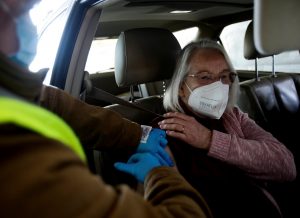
Can you still remember how you felt this time last year? Do you remember your hopes, your dreams, and your visions of the newly born decade? What’s left of those dreams one year later? If you took your wildest guess about 2020, would it be anything like the reality that unfolded? Covid-19 has taught us a great lesson: We don’t know anything, and we don’t control anything. In fact, we don’t even know what we don’t know, and we certainly can’t control something that we don’t know exists!
But if we don’t know anything, how can we make any plans? What’s the value of our high-tech medicine if a month after we rolled out the vaccines with much fanfare, three new strains of Covid appeared, for which we are not sure that the vaccines are even effective, and which are far more contagious and possibly more violent than the original strain? In the first few days in office, the new administration, which disparaged the previous one over its handling of the pandemic, has already released two defeatist declarations: The first one stated that Covid will “get worse before it gets better,” and the second, even more disheartening, stated that “There’s nothing we can do to change the trajectory of the pandemic in the next several months.” Put simply, the previous administration tried and failed, and the current administration failed before it even tried. Clearly, when it comes to Covid, there are no heroes.
This brings up interesting questions: What will happen if we surrender? What does it mean to surrender to the virus? Does it mean that we will all die or perhaps something else? Is there a way to hamper the spread of Covid-19 besides vaccines?
There are simple answers to this: We can impede the spread of the virus by following the requirements we all know are helpful: social distancing, wearing masks, and washing hands. But will that defeat the virus? Will it make it go away? At best, these measures will slow down its spread, but they will not obliterate it.
It may sound counterintuitive but to eliminate the virus, we must stop fighting it. The virus is like a grownup seeing a child about to bump his head against a low hanging branch that the child doesn’t see because he’s searching for treasures on the ground. The grownup has no choice but to push the child’s head down before he hits the branch and hurts himself. The child, who doesn’t see the branch, looks up in anger at the “aggressive” grownup and tries to keep walking upright, so the grownup is forced to push the child’s head down even more forcefully, since his push, however unpleasant, is far less painful than bumping his head into a heavy branch. The grownup tries to show the child that there’s another way that he can go, where he will find all the treasures he is looking for, and there is nothing where he insists on going. Still, the child is obstinate and insists on going the wrong way. What should the grownup do? Should he let the child keep risking himself or insist until the child understands?
The answer is clear, but not that simple to do. For the child to understand, he must stop fighting the grownup. Only then will he see the branch and look to where the grownup is pointing. But until the child gives up the fight, he will continue to push forward and the grownup will continue to stop him, a little more assertively each time.
Like that mulish child, we insist on pushing toward the normality we think is good for us: the life we had in the previous decade. However, it collapsed at the end of the decade. The appearance of Covid at its conclusion marked the demise of the old way of life, and returning to it will hurt us far more than if we bumped our heads against an allegorical low hanging branch.
The coronavirus stops us every time we try to walk back to where we came from: an outdated, obsolete world. Only if we surrender to the virus, follow the requirements to hamper its spread, we will find that along with impeding the contagion, we also learned new ways to treat each other and, inadvertently, transformed our inimical, unwelcoming society into a healthy one where it is a delight to live, where consideration, acceptance, and mutual responsibility are truly the dominant values. And once we have transformed ourselves, it will be effortless to do what it takes to completely block the spread of Covid-19, and the virus will become a chapter in our history.